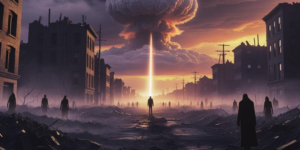3 Subtle Distinctions Between Demons and Fallen Angels
Through my observation and study of Scripture, I have come to believe, quite confidently, that demons cannot be fallen angels.
Now, I know that idea will be rather jarring for some people. It may seem that I am not only challenging a widely held traditional view but also contradicting very clear teachings of the Bible. Well, the idea that demons are not fallen angels certainly contradicts tradition. But in no way does it contradict Scripture.
The Bible speaks of demons, and it speaks of the fall of Lucifer and the co-rebellion of a third of the angels, but no verses actually link the two and define demons as fallen angels. The idea that demons are fallen angels is simply a long-held tradition. The Bible actually gives three subtle distinctions between demons and fallen angels, and I want to explore each one here.
Demons Need Bodies
Demons seek to possess bodies and seem rather uncomfortable being outside of them. Take for instance the story of a man possessed by an entire legion of demons. While being cast out, the demons in that story begged Jesus to send them into a herd of pigs:
There happened to be a large herd of pigs feeding in the distance. So the demons begged, “If you cast us out, permit us to go away into the herd of swine” (Matt. 8:30–31, MEV).
Fallen angels, however, can appear in physical form and even interact with mankind. In Genesis fallen angels even procreated with women. The bizarre procreation resulted in the birth of giants.
“There were giants in the earth in those days; and also after that, when the sons of God came in unto the daughters of men, and they bare children to them, the same became mighty men which were of old, men of renown” (Gen. 6:4, KJV).
For that procreation, God punished the “sons of God” by binding them in “everlasting chains” until the day of judgment (Jude 6). Keep in mind that every reference to “sons of God” in the Old Testament was a reference to supernatural beings or angels. Only in the New Testament does “sons of God” refer to the redeemed children of God. So we know that it wasn’t ordinary men, as some might suggest, who procreated with the “daughters of men.” Had those referred to in Genesis 6:4 been mere ordinary men, there would be no clear reason their procreation would produce giants.
Some also suggest that perhaps “sons of God” referred to a select group of people who were forbidden to procreate with a certain other group. Still, that would not explain why their union produced giants or why God punished their actions so harshly.
There are others still who say angels cannot breed, citing Matthew 22:30: “For in the resurrection they neither marry nor are given in marriage, but are like the angels of God in heaven” (MEV). But that verse tells us only that angels do not marry. Angels can still have a gender and appear to mankind in earthly bodies. The book of Hebrews tells us that angels can actually walk around among us without being noticed.
“Do not forget to entertain strangers, for thereby some have entertained angels unknowingly” (Heb. 13:2, MEV).
Consider also the angels at Christ’s empty tomb. “While they were greatly perplexed concerning this, suddenly two men stood by them in shining garments“ (Luke 24:4, MEV).
Also, the men of Sodom desired to have sex with the angels that appeared to Lot. How could that be unless the angels had bodies and looked like human beings?
“ow the two angels came to Sodom in the evening, and Lot was sitting at the gate of Sodom. When Lot saw them he rose up to meet them, and he bowed himself with his face toward the ground. … Before they lay down, the men of the city, the men of Sodom, both old and young, all the people from every quarter, surrounded the house. 5 They then called to Lot and said to him, “Where are the men who came to you tonight? Bring them out to us, so that we may have relations with them” (Gen. 19:1, 4-5, MEV).
From Scripture, we see that both fallen angels and holy angels have bodies. In contrast, demons greatly desire bodies because they do not have them. Demons are clingy, needy, angry, tormented creatures. That is the first distinction between fallen angels and demons.
Demons Wander the Earth
Demons are cursed to wander the earth while fallen angels still have the ability to stand before God in heavenly places. Though they were banished from heaven, the fallen angels still gave an account of their doings.
“Now there was a day when the sons of God came to present themselves before the Lord, and the Adversary also came among them“ (Job 1:6, MEV).
I’ll give you a few good reasons to believe fallen angels, and not just heavenly angels, were among those who stood before God in the story recorded in the Book of Job. First, the devil was no longer Lucifer, for the Book of Job refers to him as “Satan.” Second, we also know that Satan was in his fallen state because later in the story of Job he sought to steal from, kill and destroy Job. As Jesus said, “The thief’s does not come, except to steal and kill and destroy … “ (John 10:10, MEV).
Third, we know from the following verse that Job’s story took place after the great flood, which means it definitely took place after the fall of both man and Satan.
“Will you keep to the old way, that wicked men have trod? They were cut down before their time; their foundations were swept away by a flood” (Job 22:15–16, MEV).
So if Satan in his fallen state was among the angels who had to give an account in Job, it is consistent to believe that other fallen angels were called upon as well. Fallen angels can appear in heavenly places. Therefore, fallen angels are not completely bound to earth. Demons, however, can only wander the earth or live in a body, as Jesus explained:
“When an unclean spirit goes out of a man, it passes through dry places seeking rest, but finds none” (Matt. 12:43, MEV).
Nowhere in Scripture do we see demons moving from the earth to God’s presence. Those accounts are always referring to fallen angels.
Demons Are Called ‘Devils’ and ‘Unclean Spirits’
When referring to fallen angels, New Testament scriptures do not use the terms demons, devils or unclean spirits. Instead, the Bible makes reference to fallen angels by simply using a negative description or context. For example, these verses clearly describe fallen angels:
For if God did not spare the angels that sinned, but cast them down to hell and delivered them into chains of darkness to be kept for judgment …” (2 Peter 2:4, MEV).
“Likewise, the angels who did not keep to their first domain, but forsook their own dwelling, He has kept in everlasting chains under darkness for the judgment of the great day” (Jude 1:6, MEV).
“Then He will say to those at the left hand, ‘Depart from Me, you cursed, into the eternal fire, prepared for the devil and his angels'” (Matt. 25:41, MEV).
In these verses there is no mention of demons or devils. Instead, to make a distinction between God’s holy angels and fallen angels, the New Testament simply calls them the angels “that sinned” or “which kept not their first estate.”
Apart from the simple use of negative descriptions, the New Testament also uses context to draw distinctions between fallen angels and holy angels. An example of this is when, in Matthew 25:41, hell is described as a place prepared for the devil and his angels. The angels in that verse were said to belong to the devil, so it is obvious that they were fallen.
Furthermore, in the following verse, while making a strong point about the need to avoid false gospels, Paul the Apostle mentions angels “from heaven.”
“Although if we or an angel from heaven preach any other gospel to you than the one we have preached to you, let him be accursed” (Gal. 1:8, MEV).
Of course, it’s obvious that one should reject the gospel of a fallen angel, but it might not have been as obvious to the Galatians that they should reject a different gospel from even a holy angel. To drive his point home, Paul essentially warns, “Even if one of the angels from heaven should preach to you another gospel, do not be deceived.” In other words, “Don’t be swayed even if one of the good guys starts to preach a different gospel.”
Paul’s warning is an example of how the New Testament contrasts both fallen and holy angels. No special term is used to describe fallen angels; they are simply described in a negative way and/or placed in a negative context. Demons, on the other hand, are referred to as “devils,” “unclean spirits” and “demons.” {eoa}
Excerpted from Truths About Demons and Spiritual Warfare by David Diga Hernandez (Charisma House, 2016).
David Diga Hernandez (author of Carriers of the Glory) is an evangelist, healing minister, author and TV host. He heads an international healing ministry based in Southern California. David travels both domestically and internationally and his TV show, Encounter TV, is available in millions of home globally. His ministry is marked by a distinctive presence of the Holy Spirit, miracles, healing and salvation. David is a unique and emerging spiritual leader, called to take God’s saving and healing power to this generation.




























































